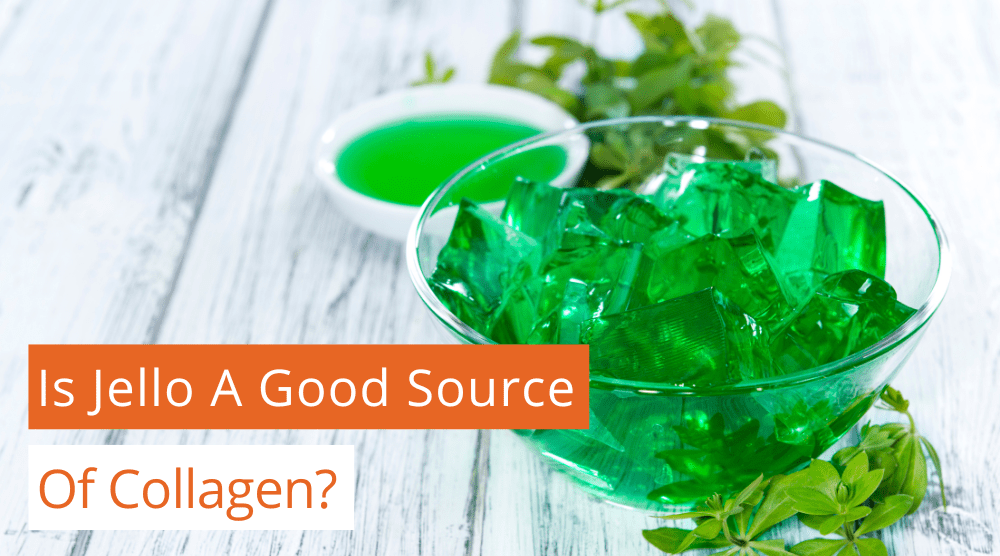Is Jello A Good Source Of Collagen? Your Questions Answered
Is Jello a good source of collagen? If you’re looking for ways to get more collagen in your diet, you may be wondering about the benefits of gelatin.
Gelatin is made from collagen, so it’s a great way to boost your intake of this important protein.
Here’s what you need to know about gelatin and collagen and how they can help give you healthy, glowing skin.
What is jello made of?
Jello is made from gelatin, a substance that is extracted from the collagen found in animal bones and connective tissues.
Collagen is one of the building blocks of skin, so consuming more collagen can help keep your skin looking supple and youthful.
Gelatin is also a good source of other important nutrients like vitamin C and calcium, making it an excellent addition to your diet.
Is jello a good source of collagen?
Yes, jello is a good source of collagen. Gelatin is made from collagen, so it’s a great way to boost your intake of this important protein.
Collagen is essential for healthy skin, hair, and nails, so increasing your intake can help you achieve a healthier appearance.
How much collagen is in a Jello?
There is typically around 10-12 grams of collagen in an average serving of jello. This is a significant amount, but if you want to get more collagen in your diet, you may also need to incorporate other sources like bone broth or supplements.
What type of collagen is in Jello?
The collagen in gelatin is Type II collagen, which is the same type of collagen found in human cartilage.
Type ll collagen is not only responsible for your skin’s elasticity and strength, it also plays an important role in healing wounds and protecting the cartilage and joints from wear and tear.
Is Jello healthy?
Jello is considered a relatively healthy food, as it is low in calories and is a good source of collagen, protein, and other important nutrients.
However, just like any other food, it is best consumed in moderation and can be high in sugar depending on the type of Jello you are eating.
As Jello is low in fiber, it is important to balance your diet by consuming other sources of protein, vitamins, and minerals.
Can you eat too much Jello?
As the saying goes, everything in moderation, and this is true when it comes to Jello.
While eating too much Jello is unlikely to cause any serious health problems, it is important to remember that Jello is still quite high in sugar and should be consumed in moderation.
Additionally, if you have a sensitivity or allergy to gelatin or other ingredients found in Jello, you may want to avoid eating it altogether.
What is the difference between collagen and gelatin?
The main difference between collagen and gelatin is that while they have similar nutritional profiles, collagen is derived from animal sources and is typically used as a dietary supplement, while gelatin is made from animal proteins and is most commonly found in foods like Jello or bone broth.
Both collagen and gelatin are beneficial for skin health, but consuming different types of collagen may have different effects on your body.
For example, type I and II collagen is especially important for skin health, while types V and VI help protect joints and cartilage.
As with any other food or supplement, it is important to speak with your doctor before adding collagen or gelatin to your diet in order to determine what is right for your individual needs.
Health Benefits of Collagen
There are many benefits that are associated with collagen that go well beyond just outward appearance. Below are some of the key benefits that you can enjoy when you increase your collagen intake:
Collagen for skin health
Collagen is essential for healthy, youthful skin. It helps to keep your skin looking smooth and supple by supporting the production of elastin and hyaluronic acid – two key components of healthy skin.
Collagen for bones and joints health
Collagen is also important in the maintenance of bones and joints, as it helps to keep your joints strong, flexible, and pain-free.
Studies published in the National Library of Medicine have also shown that collagen is beneficial for conditions like arthritis, as it can help reduce inflammation and mitigate the effects of these chronic diseases.
Collagen for hair health
Your hair is also made up of collagen, so increasing your intake can help to improve the health and appearance of your locks.
A study published in the International Journal of Molecular Sciences suggests that increasing your collagen intake can help to strengthen your hair, prevent breakage, and promote growth.
Collagen for nail health
As with hair, collagen, along with keratin, is a major protein that is found in your nail beds.
Research has shown that boosting your collagen peptides has resulted in an increase in nail growth by 12% and decreased breakage by 42%.
While some criticize the study due to the limitations on amounts of participants, mainly due to funding, it concluded that about 80% of participants agreed that the use of collagen peptides improved their nail appearance.
Collagen for heart health
A study published in the Journal of Atherosclerosis and Thrombosis suggests that collagen is beneficial for heart health, as it can help reduce cholesterol and prevent the formation of plaque in the arteries.
Additionally, collagen provides the structure for your arteries, which results in better blood flow to and from your heart – which we can all agree is vitally important!
What else are good sources of collagen?
While collagen is found in many food sources, there are other foods that also provide collagen-like proteins which have been shown to have health benefits. Some of these include:
Bone broth
Bone broth is rich in collagen-like proteins, as well as other nutrients that are beneficial for your health.
Consuming this nutrient-dense food is a great way to boost your collagen intake and enjoy the many benefits it has to offer, including stronger bones and joints, better skin and nails, improved gut health, and more!
Egg whites
Egg whites are another excellent option for those looking for natural ways to increase collagen.
Collagen’s main components are amino acid glycine and proline, which egg whites are rich in, and due to their popularity in today’s diet, make for an easy way to consume high amounts of collagen-like proteins!
Spirulina
Spirulina is a type of blue-green algae that is rich in protein, vitamins, minerals, and antioxidants. It is also a good source of collagen-like proteins, which makes it an excellent choice for those looking to increase their collagen intake.
Spirulina is typically harvested from freshwater lakes and ponds and is available in powdered form, capsules, or tablet form.
While it is still being explored for its potential health benefits, there is growing evidence that spirulina may help to promote healthy skin and hair, as well as support gut health and heart health.
Codfish
Codfish is another great source of collagen and a tasty menu option.
Cod is rich in essential vitamins and minerals, including vitamin B12, niacin, selenium, phosphorus, and potassium. It is also a good source of collagen-like proteins and is often featured in dishes like fish tacos or as part of sushi rolls.
With its mild flavor and numerous health benefits, cod is an excellent addition to any diet!
Citrus fruits
Citrus fruits, such as oranges and grapefruit, are rich in collagen-like proteins and contain high amounts of vitamin C.
These types of fruits have been shown to have a range of health benefits, especially for your skin and hair as they can help promote healthy growth, reduce inflammation, support collagen production, and more.
Sulfur foods
Sulfur is a key component of collagen, and these types of foods can help support collagen production in the body.
Additionally, sulfur-rich foods have been shown to have a range of other health benefits, such as supporting gut health, reducing inflammation, and more. Some sulfur-rich foods include garlic, onions, Brussels sprouts, broccoli, and cabbage.
While there are many different sources of collagen out there, these are just a few of the most popular options.
No matter which source you choose, make sure to consult with your doctor to determine what is best for your diet and health goals and enjoy the many benefits that collagen has to offer.
Conclusion
If you are considering ways to improve your collagen levels, then look no further than jello! This popular snack is made from gelatin, which is rich in collagen-like proteins and is a great addition to any diet.
Not only is jello delicious and easy to incorporate into your meals, but it can also help improve your overall health and promote glowing skin, stronger bones, and joints.
If you’re looking for ways to improve your collagen levels, be sure to check out some of our other health blog posts.
You can also listen to our podcasts for more information on collagen and its benefits, or try one of our recommended collagen supplements!
Organixx Clean Sourced Collagens blend contains five types of collagen from four sources. What’s more, it’s combined with targeted nutrients such as zinc, vitamin C, and vitamin B6 which specifically enhance the bioavailability and potency of collagen. Clean Sourced Collagens is formulated from the ground up to enhance and support your body’s natural ability to heal and rebuild itself from the INSIDE out.






I eat sugar free Jello frequently. I am addicted to sugar and I no longer eat sugar and find that the artificial sweeteners in Jello do not make me crave sugar. Can you please address artificial sweeteners in Jello products.
I am making jello for dessert tonight, can I add unflavored collagen powder to it when I'm making it? Will it ruin it? If it makes it thicker, that's okay.
Hi Karin,
Thanks for your interest. Yes, you can add our Clean Sourced Collagens to any food or beverage of your choice including Jell-O. As it is tasteless, odorless, and dissolves easily, it's also perfect for cooking & baking too. We hope this helps and wish you a happy & healthy day.
Good Article!